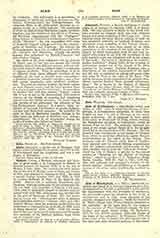

Alaman, LUCAS, a Mexican statesman and historian of great merit, b. at Guanajuato in Mexico, of Spanish parents, October 18, 1792; d. in the city of Mexico, June 2, 1853. He received his early education in the city of Mexico, went to Spain and France in 1814, and returned to America in 1815. He made a second voyage between 1815 and 1823; in 1824 he became Secretary of State of the Mexican Republic. Alaman was a moderate Republican, and, therefore, violently persecuted by the extremistic factions in 1834, and compelled to hide for a full year. After 1836 he dedicated himself to literary and historical work until 1851, when Santa Ana recalled him to the post of Secretary of State. His two monumental works are: “Disertaciones sobre la Historia de la Republica mexicana” (Mexico, 1844), and “Historia de Mexico, desde los primeros movimientos que prepararon su independencia en el ano de 1808, hasta la epoca presente” (Ibid., 1849). With the exception of the (now antiquated) conceptions of the primitive condition of the Mexican Indians, these works are of standard value.
AD F. BANDELIER

